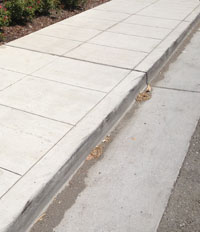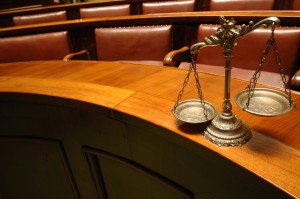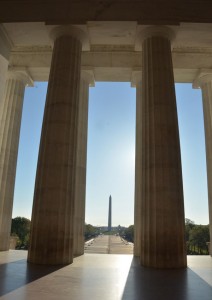 Lunch at Justia is a time reserved for scholarly legal debate. Our focus recently turned to the legality of parking a vehicle along an unmarked curb outside a local Chipotle. On a day when we thought the God of Parking was gracing us with his magnificence, any semblance of karma was purely illusory.
Lunch at Justia is a time reserved for scholarly legal debate. Our focus recently turned to the legality of parking a vehicle along an unmarked curb outside a local Chipotle. On a day when we thought the God of Parking was gracing us with his magnificence, any semblance of karma was purely illusory.
First, we pulled adjacent to the curb. From California Vehicle Code § 21458, we know the meaning of the following curb colors:
(1) Red indicates no stopping, standing, or parking, whether the vehicle is attended or unattended, except that a bus may stop in a red zone marked or signposted as a bus loading zone.
(2) Yellow indicates stopping only for the purpose of loading or unloading passengers or freight for the time as may be specified by local ordinance.
(3) White indicates stopping for either of the following purposes:
(A) Loading or unloading of passengers for the time as may be specified by local ordinance.
(B) Depositing mail in an adjacent mailbox.
(4) Green indicates time limit parking specified by local ordinance.
(5) Blue indicates parking limited exclusively to the vehicles of disabled persons and disabled veterans.
So, since the curb was not red, we were in the clear, right?
 The jury in Oracle’s Java code copyright lawsuit against Google began deliberating this afternoon in federal court in San Francisco, California.
The jury in Oracle’s Java code copyright lawsuit against Google began deliberating this afternoon in federal court in San Francisco, California.
 Jerald Bovino, the holder of a U.S. Patent (
Jerald Bovino, the holder of a U.S. Patent ( Our
Our  During a recent trip to Washington, D.C., I discovered that the reflecting pool between the
During a recent trip to Washington, D.C., I discovered that the reflecting pool between the  If you think that texting is so ’90s, guess again.
If you think that texting is so ’90s, guess again.

 Lunch at Justia is a time reserved for scholarly legal debate. Our focus recently turned to the legality of parking a vehicle along an unmarked curb outside a local
Lunch at Justia is a time reserved for scholarly legal debate. Our focus recently turned to the legality of parking a vehicle along an unmarked curb outside a local  The Second Circuit overturned the conviction of programmer Sergey Aleynikov, who was found guilty of violating the National Stolen Property Act (
The Second Circuit overturned the conviction of programmer Sergey Aleynikov, who was found guilty of violating the National Stolen Property Act (